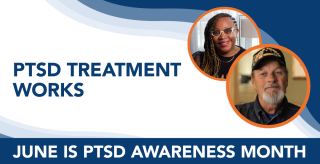June is National PTSD Awareness Month

June is National Post Traumatic Stress Disorder Awareness Day or PTSD Awareness Day.
There are currently about 12 million people in the United States living with PTSD.
Even though PTSD treatments are effective and accessible, most people don't get the help they need. Everyone with PTSD—whether they are a Veteran or civilian survivor of sexual assault, serious accident, natural disaster, or other traumatic event—needs to know that treatments really do work and can lead to a better quality of life.
PTSD is a mental health problem. PTSD can only develop after you go through or see a life-threatening event. It's normal to have stress reactions to these types of events, and most people start to feel better after a few weeks or months.
It's normal to have upsetting memories, feel on edge, or have trouble sleeping after a traumatic event (also called "trauma"). At first, it may be hard to do daily activities you are used to doing, like go to work, go to school, or spend time with people you care about. But most people start to feel better after a few weeks or months. For some people, PTSD symptoms may start later, or they may come and go over time.
If it's been longer than a few months and thoughts and feelings from the trauma are upsetting you or causing problems in your life, you may have PTSD.
Anyone can develop PTSD at any age. Some factors can increase the chance that someone will have PTSD, many of which are not under that person's control. For example, having a very intense or long-lasting traumatic event or getting injured during the event can make it more likely that a person will develop PTSD. PTSD is also more common after certain types of trauma, like combat and sexual assault.
Personal factors—like previous traumatic exposure, age, and gender—can affect whether or not a person will develop PTSD. What happens after the traumatic event is also important. Stress can make PTSD more likely, while social support can make it less likely.
PTSD symptoms usually start soon after the traumatic event, but they may not appear until months or years later. They also may come and go over many years. If the symptoms last longer than four weeks, cause you great distress, or interfere with your work or home life, you might have PTSD.
There are 4 types of PTSD symptoms, but they may not be exactly the same for everyone. Each person experiences symptoms in their own way.
- Reliving the event (also called re-experiencing symptoms). Memories of the traumatic event can come back at any time. They can feel very real and scary. For example: You may have nightmares. You may feel like you are going through the event again. This is called a flashback. You may see, hear, or smell something that causes you to relive the event. This is called a trigger. News reports, seeing an accident, or hearing fireworks are examples of triggers.
- Avoiding things that remind you of the event. You may try to avoid situations or people remind you of the trauma event. You may even avoid talking or thinking about the event. For example: You may avoid crowds, because they feel dangerous. You may avoid driving if you were in a car accident or if your military convoy was bombed. If you were in an earthquake, you may avoid watching movies about earthquakes. You may keep very busy or avoid getting help so you don't have to think or talk about the event.
- Having more negative thoughts and feelings than before the event. The way you think about yourself and others may become more negative because of the trauma. For example: You may feel numb—unable to have positive or loving feelings toward other people—and lost interest in things you used to enjoy. You may forget about parts of the traumatic event or not be able to talk about them. You may think the world is completely dangerous, and no one can be trusted. You may feel guilt or shame about the event, wishing you had done more to keep it from happening.
- Feeling on edge or keyed up (also called hyperarousal). You may be jittery, or always alert and on the lookout for danger. You might suddenly become angry or irritable. For example: You may have a hard time sleeping. You may find it hard to concentrate. You may be startled by a loud noise or surprise. You might act in unhealthy ways, like smoking, abusing drugs or alcohol, or driving aggressively.
We encourage everyone to not only seek help if you are experiencing any of these symptoms but to also work to raise awareness so that others who may be suffering the effects of PTSD will know that there is treatment.
To get more information on how to get care for yourself or a loved one who may be suffering the effects of PTSD, visit www.ptsd.va.gov.

